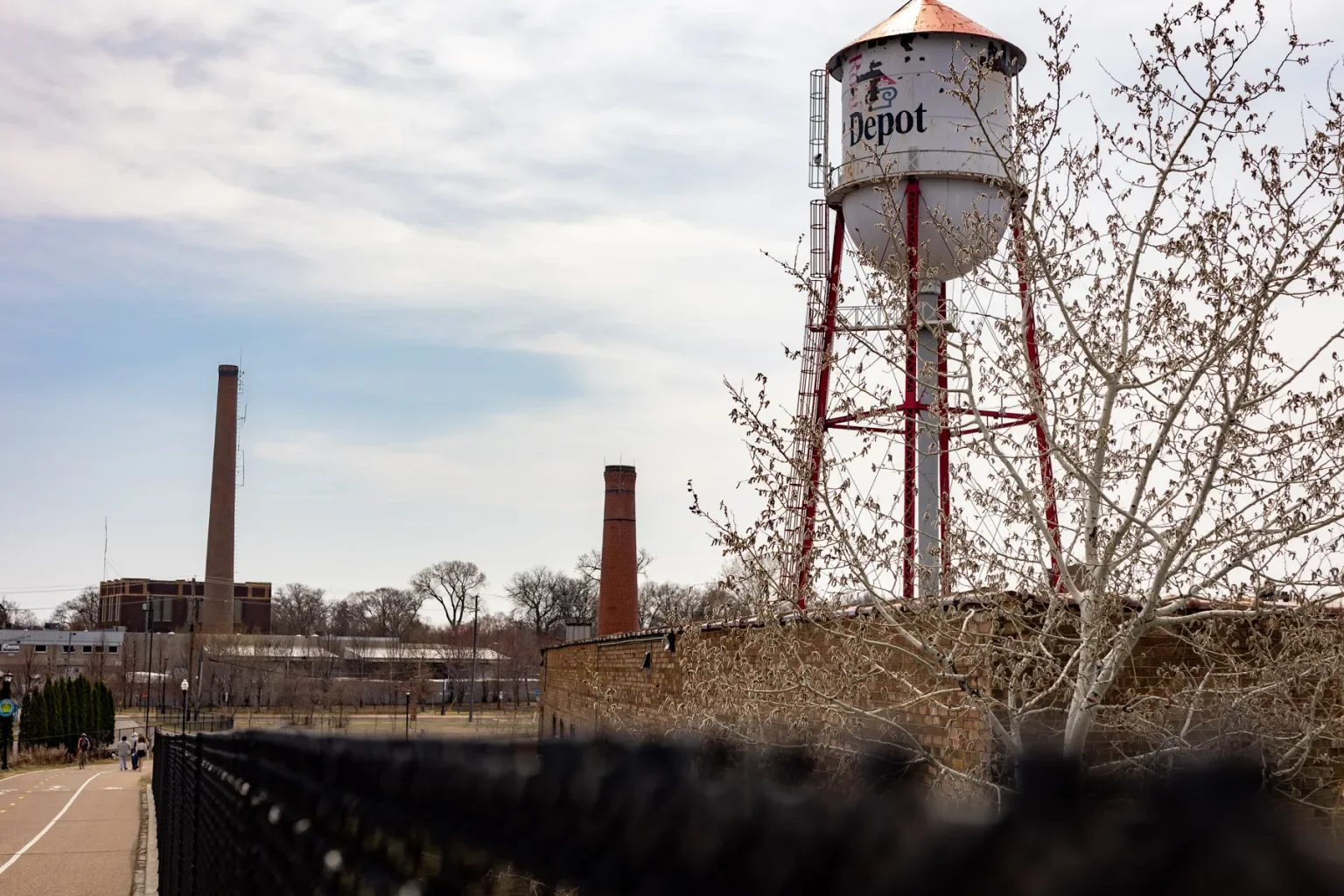Sahan Journal: Group behind Roof Depot project asks Minneapolis for lower price after legislators fail to deliver promised funds
The Roof Depot site in south Minneapolis, seen in 2021. The East Phillips Neighborhood Institute is waiting for additional state funds to transform the former warehouse into an urban farm and community hub. Credit: Ben Hovland | Sahan Journal
by Andrew Hazzard and Cynthia Tu
The group attempting to convert a former Sears warehouse in south Minneapolis into an indoor urban farm and community hub is asking the city to lower its selling price for the building as the deadline for a purchase agreement nears.
The East Phillips Neighborhood Institute (EPNI), the nonprofit behind plans to reimagine the building at 28th Street and Longfellow Avenue, missed out on promised state funding two years in a row to complete the $15.9 million sale. Now the group is negotiating with the city, and asking for a $10.2 million price as a September 15 deadline nears.
The structure is commonly known as the Roof Depot building, after the construction equipment company that was its most recent tenant. It has sat vacant for years.
Joe Vital, interim executive director of EPNI, said the group hopes the city will agree to let it carry out plans for a community owned and oriented project in a neighborhood known for its diversity and history of industrial pollution. The group says the city has been slow to respond in negotiations, in effect stonewalling the community’s ability to carry out its vision.
“We are asking the city to work with EPNI,” he said.
After years battling the city in court and through public protest movements, EPNI halted plans to demolish the building in February 2023 and secured an arrangement with state lawmakers to buy the property. The Minneapolis Public Works Department intended to use the 7.5 acre site to expand its campus in the neighborhood and consolidate its water department operations. Neighbors want to convert the 230,000 square foot warehouse into an indoor urban farm, local business center and community hub.
State lawmakers promised $12.2 million to broker a deal between the city and EPNI to allow the nonprofit to buy the building while making Minneapolis taxpayers whole. Lawmakers allocated $6.5 million in 2023, and promised another $5.7 million the next year, contingent on EPNI raising $3.7 million of its own. EPNI secured the money, but lawmakers failed to approve the second batch of funding.
The city amended the purchase agreement in 2024 to give the institute another year to secure the remaining funding. But after a second year of failed funding from St. Paul, EPNI is asking the city to sell the site for the $10.2 million it currently has available.
“The city is in the process of reviewing this newly reduced offer, which comes after years of EPNI’s failed fundraising, even with numerous extensions already granted by the city. We will continue to communicate with EPNI with enough time to meet the upcoming deadlines,” city spokesman Allen Henry said in a statement.
EPNI has the resources, plans and connections to make the project a reality, Vital said. But interested investors want to get access to the building before fully committing to the project, he said, and EPNI hasn’t been able to enter the site other than a brief walk-through with team members and a structural engineer in 2023.
But the group doesn’t have the time to fill the $5.7 million funding gap before the deadline, Vital said.
The $15.9 million price, brokered by state lawmakers, was intended both to cover the cost of the site, and to compensate the city for money invested into the plans to consolidate Minneapolis water services there. The actual sale price for the site alone is $11.4 million, according to the purchase agreement.
Vital said EPNI is seeking a meeting with Mayor Jacob Frey in the next week to continue negotiations.
If the city holds fast to the $15.9 million price tag, Vital said the group will push hard for site access. Getting into the building and being allowed to begin outdoor farm work at the site would help attract more investment, he said.
“What we are asking for is to begin redevelopment so we can showcase to investors that we’re serious about this project,” Vital said.
Plans for outdoor farm, land ownership
If EPNI had site control, the group could immediately begin operations on a 30,000 square foot outdoor farm while the building is renovated, according to EPNI farm coordinator Kieran Morris. The group has extensive plans and grant funding from the Minnesota Pollution Control Agency and Mississippi Watershed Management Organization to start outdoor operations in earnest, he said.
“I believe it is on the mayor and on the city to secure a legacy that’s going to, in the present moment, save lives and get healthy, nutritious food and education to folks, but also create an example that other communities that have faced pollution and discrimination can follow,” Morris said.
Morris has helped lead several community educational courses on urban farming in the past two years, and the group distributes free produce grown at community gardens to people in the neighborhood.
Jolen Jones, a longtime resident of East Phillips’ Little Earth of United Tribes, said Little Earth Protectors will be committing $1 million to the project. The institute’s goal is to create a community ownership model for the Roof Depot site. Under the arrangement, Little Earth Protectors, a nonprofit, would own the land on which the site sits, but not the building itself, in an arrangement similar to the community land trust model.
“We would like to invest a lot into the land and owning the land because we believe in land back,” Jones said, referring to the movement to restore property to Native American tribes. “We shouldn’t be sitting here, as Little Earth, arguing over the land. We should be the owners of that land.”

